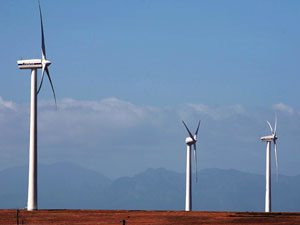
MXOLISI Mgojo has overseen a successful first six months as CEO of Exxaro Resources, but the group’s strategic bet on making renewable energy a sizeable part of its energy offering looks somewhat uncertain at present.
“The whole energy space is something where, as a group, we are wanting to focus more on,” he said at Exxaro’s half-year results in which it largely put pay to a past strategic blunder by selling its Moyoko iron ore project which it wrote down for R5.36bn for R27m.
“In terms of renewables we will look at more opportunities there,” he said.
Mgojo is no doubt heartened by the first ever profit from Exxaro’s first renewable energy investment, its 50/50 joint venture with Tata Power Company called Cennergi.
The company, which reached commercial operation in July, connected two wind farms to Eskom’s grid. The farms, which will generate 229MW by the year-end, are on budget and commissioned on time.
The plan now is to find renewable energy opportunities where the owners are in financial distress, said Mgojo. The idea is that the investment has already been made both in terms of the solar or wind farms and in terms of having already qualified as an Independent Power Producer (IPP) with the Department of Energy (DoE).
“That would get us into a derisked project instead of trying to bid in a later window where the pricing and returns would be lower,” said Mgojo.
There are headwinds with this in the shape of Brian Molefe, Eskom CEO, who announced at the group’s annual results in June that he preferred building nuclear power to renewable energy IPPs. “I’m uncomfortable with the high cost of IPPs,” he said.
“They are the most expensive form of generation. One day, they may mature and become the cheapest form of power, but right now, they are not,” he added. According to Eskom data, IPPs represent 18% of total primary energy cost but only 4% of generation.
Mgojo said the challenge of tackling Molefe’s antipathy was “a million dollar question”, but that policy would probably win out in the end. “All I can say is that if you listen to the [energy] minister, [Tina Joemat-Pettersson] as far as she is concerned nothing has changed with the current programme.
“I guess it will be one of those things between the Department of Public Enterprises (to which Molefe reports) and the Department of Energy who will have to sort things out,” he said. “Eskom has stated that all those projects in the pipeline will continue getting a connection,” he added.
The programme to which Mgojo refers is the Renewable Energy Independent Power Producer Procurement Programme (REIPPPP) of which there have been four windows – or periods in which IPPs have bid – through which some 3,901MW has been contracted by Eskom.











